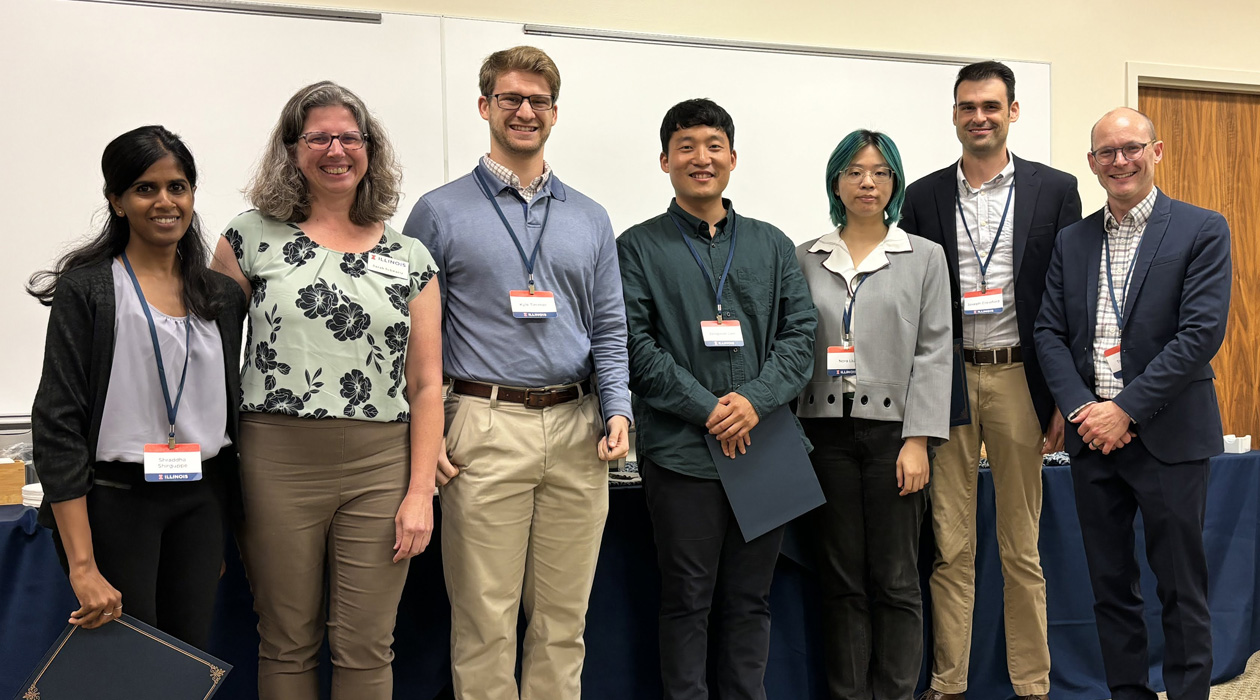Early Innovator Program pitch contest winners announced

From left to right, Shraddha Shirguppe, Sarah Schwartz, Kyle Timmer, Jongwon Lim, Nora Liu, Joe Crawford, and Tracy Parish. / Isaac Mitchell
It has been a busy summer for a group of postdoctoral and graduate student researchers who participated in the 10-week Early Innovator Program (EIP) at the Carl R. Woese Institute for Genomic Biology (IGB). On July 30, six aspiring entrepreneurs made their final pitches to a judging panel, and three were awarded tiered funds ranging from $2,000-$5,000 to continue to advance their novel innovations.
Shraddha Shirguppe received first prize for Genvivo Solutions, a platform technology focused on the development of precise, genetically engineered cancer animal models across a range of species. Shirguppe is a graduate student in bioengineering, working in the Perez Lab (ACPP).
Jongwon Lim was awarded second prize for his D3 Solution (Direct, Dry, Diagnostic), which would allow rapid detection of sepsis utilizing low-cost blood drying techniques. Lim is a graduate student in bioengineering, working in the Bashir Lab (CGD/M-CELS).
Kyle Timmer received third prize for RotatorRenew, an implantable, regenerative biomaterial for rotator cuff repair. The material is designed to structurally mimic the tendon-to-bone interface and promote appropriate cell behavior to improve repair effectiveness. Timmer is a graduate student in chemical and biomolecular engineering in the Harley Research Lab (RBTE).
This year’s EIP judges included Jesse Dill, Senior Director of Business Development at Ginkgo Bioworks; Jack Marck, Managing Director of Gener8tor Ventures’ Illinois AgTech Accelerator; and Tom Parkinson, Senior Director at Illinois Ventures. The judges had a difficult decision to make, and applauded all the participants for their innovative concepts and solid presentations.
Other participants in the pitch competition included Shivali Banerjee, a postdoctoral researcher at the Center for Bioenergy and Bioproducts Innovation (CABBI) lab developing products based on natural pigments; Joe Crawford, a postdoctoral researcher at CABBI developing a tool to measure water use based on leaf structures to improve irrigation decisions; and Nora Liu, a graduate student in the Biosystems Design theme working to discover natural products for use in antibiotics.
The EIP program is designed to teach participants the skills necessary to become innovative leaders in their fields, and to support IGB scientists in considering creative ways to bring science to society. Trainees learn from subject matter experts about the process of innovation, protecting and developing discoveries beyond the laboratory, and bringing new technologies and services to the marketplace.
